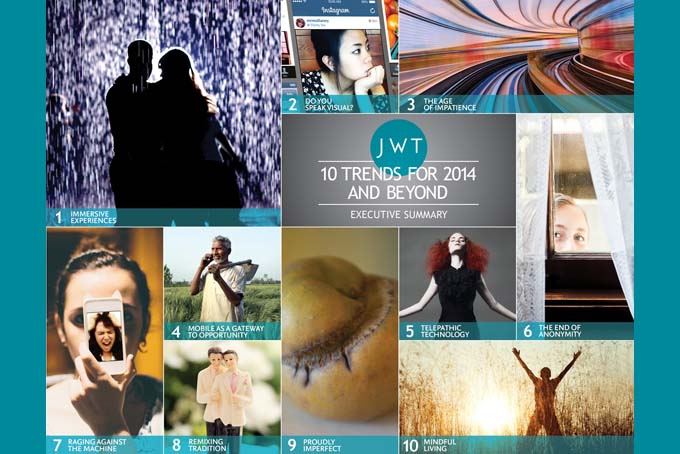
NEW YORK (AP) — Forget the fear of missing out. In 2014, trend watcher JWT thinks JOMO — the joy of missing out — will take deeper root in the mainstream.
Among the global advertising and marketing company’s predictions for the new year is a march to “mindful living,” with more consumers actively trying to shut out distractions and focus on the moment. But as trend reports often go, this one is mixed, for Mindful Living is listed with The Age of Impatience in JWT’s Top 10 for next year.
In the peace-of-mind department, look no further than the Slow Food Movement broadening, simply, to Slow; the rise of the digital detox like Camp Grounded in Northern California’s Anderson Valley; and Silicon Valley’s infatuation with all things Zen, said Ann Mack, the company’s director of trend-spotting.
Google already offers employees meditation as part of a “Search Inside Yourself” course, along with regular silent “mindful” lunches, for instance. And there’s an app or three, including Headspace for on-the-go meditators who are prompted to check in with themselves, Mack said.
The mind-calming, mind-blowing concept goes like this, according to Mack: “You’re enjoying what you’re doing in the here and now and not on social media broadcasting or seeing what everybody else is doing.”
WOW. As for JOMO, as opposed to FOMO, Mack credits tech blogger Anil Dash for coming up with the former when he realized after a month unplugged following the birth of his son that he happily hadn’t missed anything at all.
While some people work on their downward-facing dogs at yoga class, the on-demand economy will churn away in 2014, said the ninth annual JWT report.
To satisfy the need for all things instant, binge viewing and same-hour delivery bubbled up to satiate all age segments, especially hyperconnected Millennials who expect things can be achieved, acquired and enjoyed with the help of mobile technology in real time. Even they’re pushing back some on how they perceive technology, Mack said in a recent interview.
“I think the real surprise is the fact that as we get more immersed in technology we’re starting to question its siren call, although we’re not resisting it entirely,” she said.
“There’s a Jekyll and Hyde quality that we speak about in raging against the machine. You know, we are still very much embracing it but resisting it simultaneously,” Mack added. “Over the past several years we’ve let technology rule us and now we’re ready to rule it and find a balance in our lives because we realize technology is here to stay but it’s fundamentally changing our relationships, our behaviors, perhaps even our brains.”
Which leads to another JWT prediction: the rise of Telepathic Technology.
Google Glass? So yesterday.
The report said brain-computer interfaces, or BCIs, will push further into the commercial mainstream next year. Currently nascent, mind-controlled cars to art exhibits rely on the brain-wave activity of consumers. As traditional EEG systems have been pared down, they’re no longer the domain of health providers alone.
Applications at a lower cost have proliferated for commercial consumption, the report said.
A Silicon Valley company called NeuroSky is looking ahead, partnering with Mattel to create mind-powered toys, for example, while another company has come up with a headset that can read a wearer’s mood to provide the perfect playlist, according to the report.
“Researchers and programmers from Egypt to the U.K. and the U.S. are refining the ability to get computers to read human emotions through a practice known as affective computing,” the report said. “As emotion recognition advances, tech manufacturers will start building it into devices, enabling gadgets to recognize and react to how users are feeling. Think Siri being more sympathetic to frustrated users.”
While Siri sorts herself, proudly imperfect as the new perfect will take a stand next year, according to JWT.
Blemished fruits and vegetables are touted as best over the waxed-up grocery kind and “ugly selfies” are the new selfies across social media as authenticity makes a comeback, Mack said. We’ve got celebrities without makeup, books on imperfect parenting and the anti-Photoshop movement leading the way, she added.
“Increasingly,” Mack said, “we’re not equating perfect with good, or good for us.”
Other JWT predictions for 2014:
— IMMERSIVE EXPERIENCES
Nabbing the minds and attention of consumers will be an increasingly multisensory affair. Outbreak Missions in Manila is among the companies offering Zombie runs, in its case a 5K called Zombie Apocalypse where victims must find a cure for an outbreak or un-die trying. In New York, lines were hours-long at the Museum of Modern Art for the chance to experience the Rain Room. Falling rain paused when a human body approached. Watch next year for Oculus Rift, a virtual reality headset that makes players feel like they’re inside the game screen.
— SPEAKING VISUAL
With the rise of photos, emojis and video snippets, “visual” has become a language of its own that savvy companies will embrace in a big way. Taco Bell and the frozen yogurt chain 16 Handles have sent disappearing 10-second coupons and new product teasers using Snapchat, JWT said. And Sony took to Pinterest for “Pin It to Give It,” where the company donated a dollar to charity with every re-pin.
— THE END OF ANONYMITY
Big Bro has technology on his side. Look for things to get even dicier, shopper-wise. The snack food behemoth Mondelez is testing a “smart shelf” with sensors to figure out the demographics of people choosing certain products and brands. A company called NEC has come up with a facial recognition system, NeoFace, for salespeople to identify VIP customers. Accessories are proliferating for people who don’t want their data mined. OFF Pocket, for instance, blocks GPS, Wi-Fi or cell signals from reaching a mobile phone.
___
Follow Leanne Italie on Twitter at https://twitter.com/litalie
___
Online:
https://www.jwt.com/